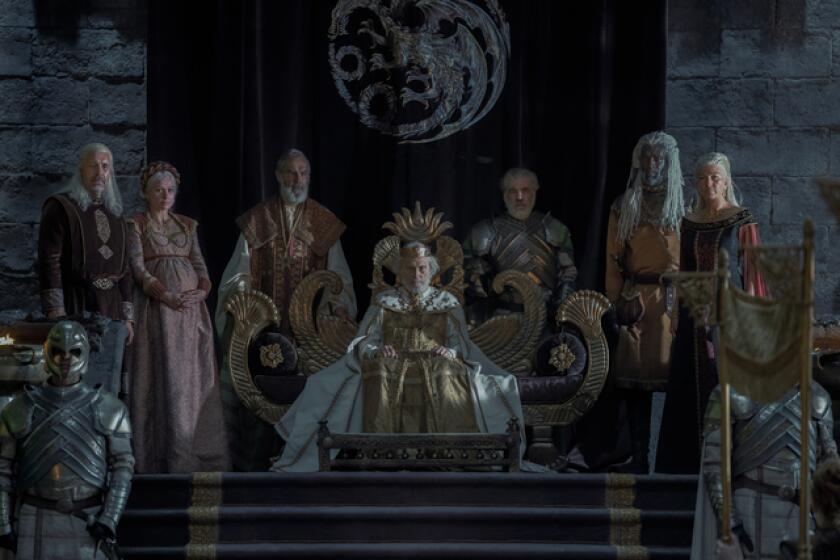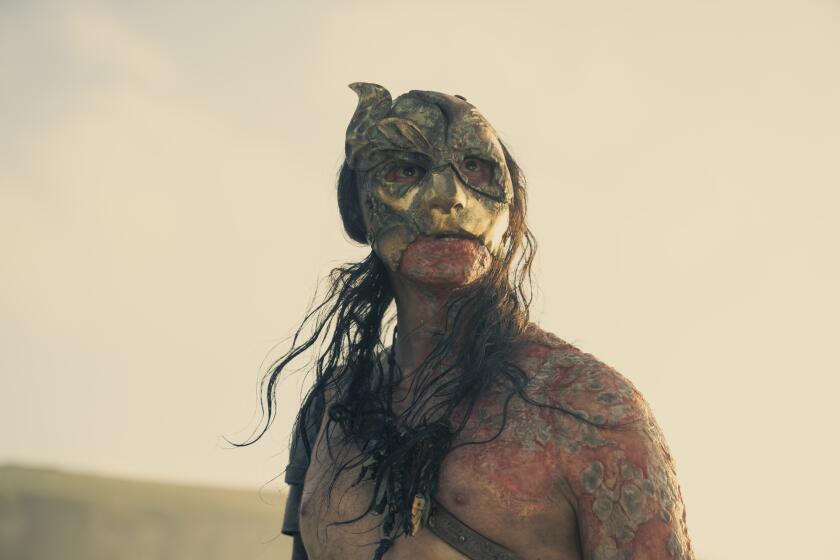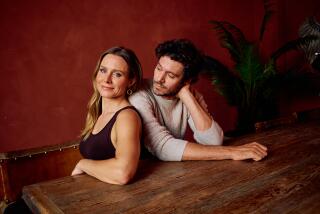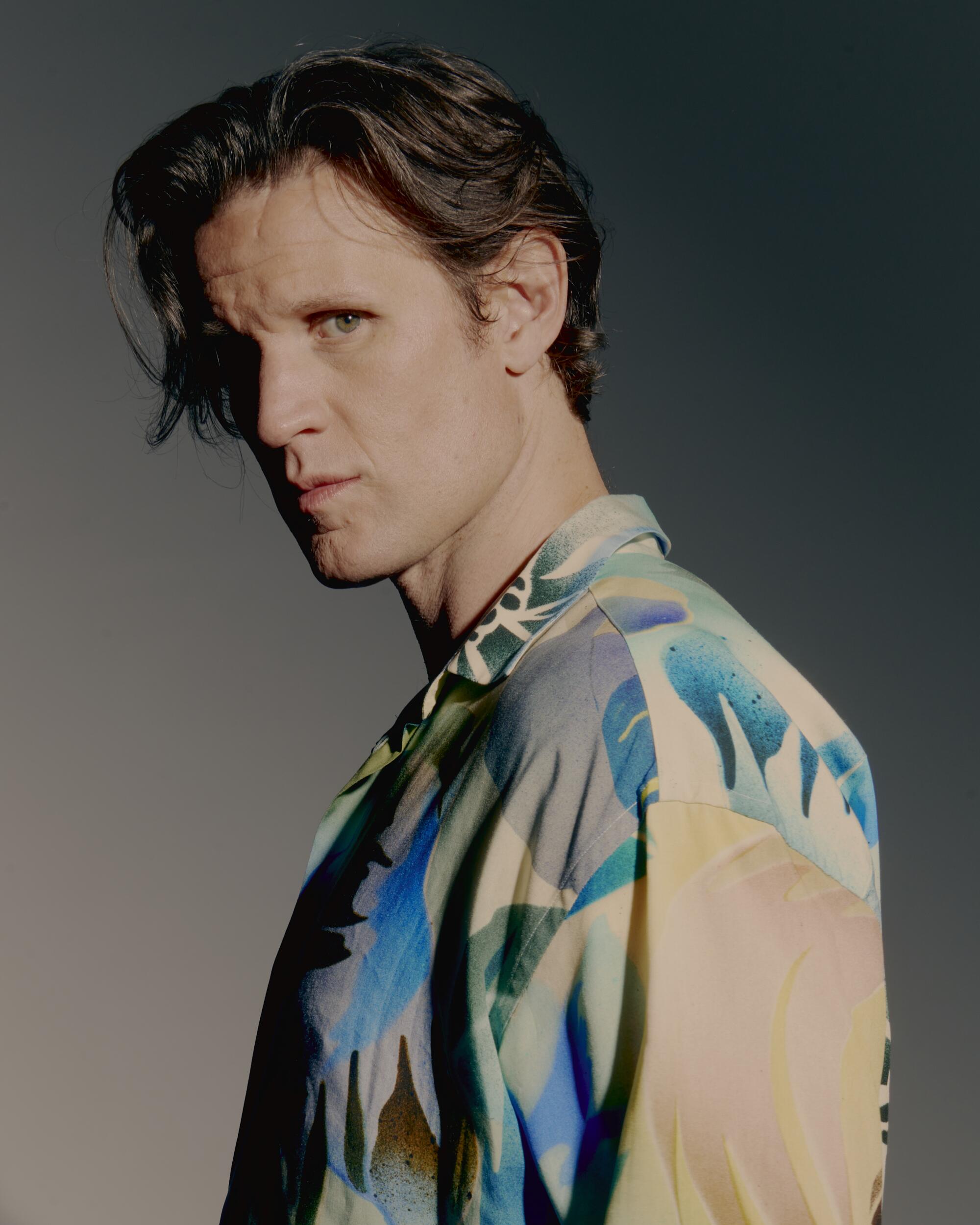
NEW YORK — Matt Smith is tired — very tired — but you wouldn’t know it from speaking to him.
In a dimly lit hotel lounge in Tribeca, the actor, who turns 40 later this month, bounds enthusiastically from one topic to the next. A curious, sharp-witted performer who likes to ask as many questions as he answers, Smith is ostensibly here to promote his current project, “House of the Dragon.”
But he happily digresses into myriad subjects, like his favorite shows to rewatch (“I’m Alan Partridge” and the American version of “The Office”) and his admiration for Keanu Reeves (“The last time I was here, I saw him in the lobby and I really wanted to go, ‘I love you, Keanu Reeves’”), freely quoting T.S. Eliot’s poem “The Love Song of J. Alfred Prufrock” along the way.
It’s only when he points to a baby in the courtyard outside and whispers conspiratorially, “That baby was crying all night, poor thing,” that he betrays any hint of fatigue.
Whether you’re new to Westeros or making a long-awaited return, here’s everything you need know about the ‘Game of Thrones’ prequel, updated weekly.
One can imagine his character, the impetuous Prince Daemon Targaryen, behaving quite differently under similar circumstances. In the “Game of Thrones” prequel, which opens about two centuries before the events of the original series, Smith plays the dragon-riding brother — and eventual son-in-law — of King Viserys (Paddy Considine). A mercurial figure who walks a nearly indistinguishable line between rogue and psychopath, Daemon has, over the course of nine episodes, murdered his first wife in cold blood, abruptly beheaded a man for making accurate statements about the paternity of the king’s grandchildren, literally killed the messenger and married his own niece.
Yet Daemon is, if not the most likable, then probably the most charismatic character in “House of the Dragon,” which concludes its first season Sunday night. With the cretinous Aegon (Tom Glynn-Carney) installed on the throne against the dying wishes of his father, King Viserys, who wanted his daughter (and Daemon’s wife) Rhaenyra (Emma D’Arcy) to succeed him, the Targaryens stand on the brink of civil war — ideal circumstances for Daemon, someone who is “most alive when things are going wrong,” says Smith. “His brother’s death is going to have a bigger effect on him than he probably even realizes.”
The actor, in black jeans, a silky patterned shirt reminiscent of 1980s upholstery and well-worn Italian work boots, is equally comfortable in high-stakes roles.
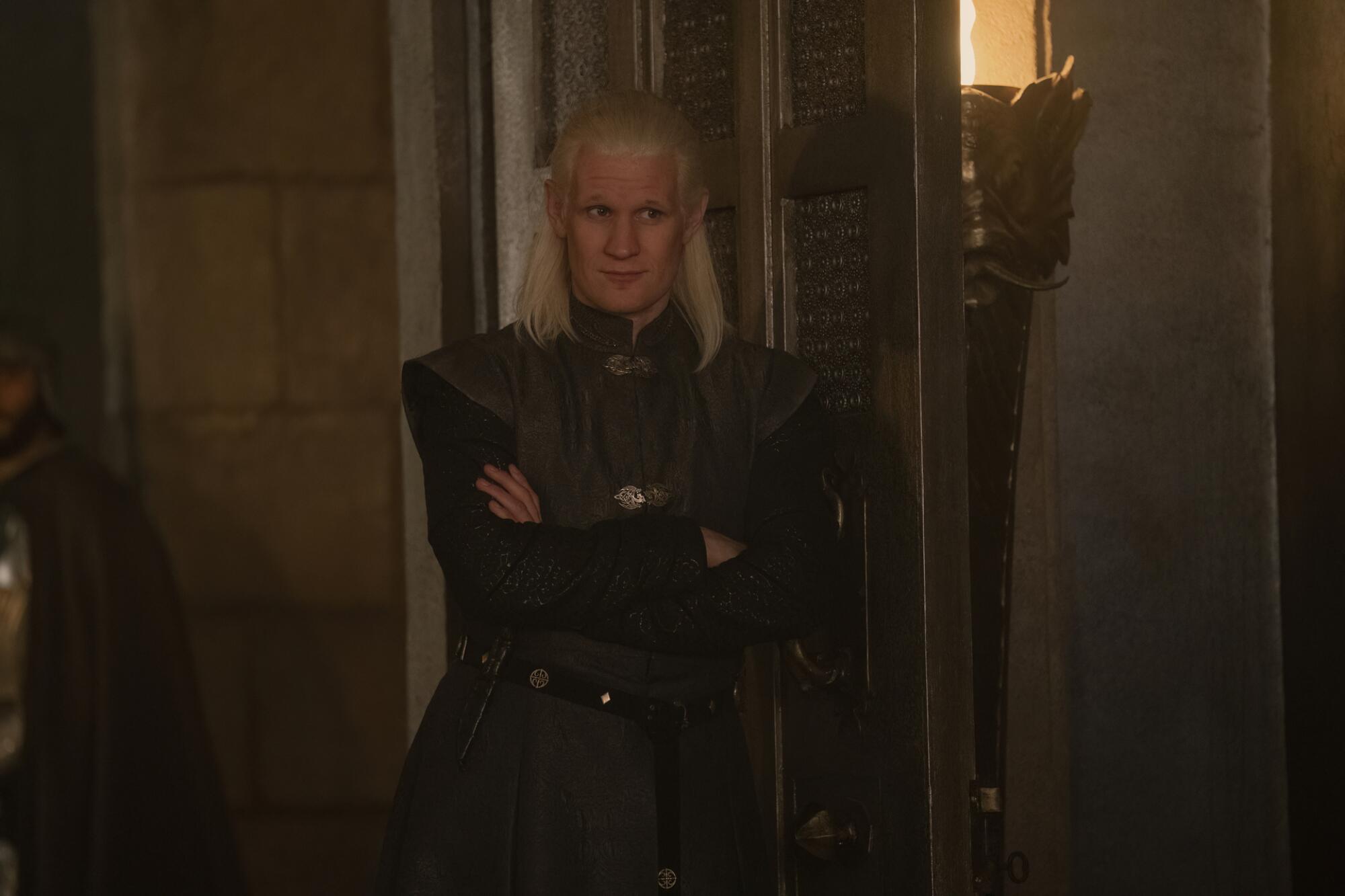
As a teenager, Smith was on a path to becoming a professional soccer player, but a back injury forced him to quit the sport entirely. Encouraged by a teacher, he decided to pursue drama. With few TV and stage credits to his name, Smith, then just 26, was cast as the Eleventh Doctor in “Doctor Who,” the long-running science fiction program that is nearly as central to British culture as the monarchy. Fittingly, he followed it up by starring as a youthful Prince Philip in the first two seasons of “The Crown,” humanizing the Duke of Edinburgh as a thrill-seeking adventurer who struggles to adjust to life in his wife’s shadow.
It’s about a week after the death of Queen Elizabeth II, and Smith has changed his flight so he can make it back to London to watch the funeral with his mother. Though he was not a passionate royalist before making “The Crown,” he eventually became fond of both the institution and the flawed characters within it — including Philip, not often cited as the most lovable of royals. “Philip’s sense of duty to [Elizabeth] and the country was enormous. He didn’t get everything right, but he got a lot right. And he was just incredibly charismatic. What a character. He didn’t give a flying f—.”
Any similarities between Philip and Daemon are, of course, coincidental.
Over a cup of English breakfast tea (and a later follow-up by phone), Smith talked about stepping into the “Game of Thrones” universe, the messiness of the Targaryens, and why he doesn’t worry much about the taboo relationship between Rhaenyra and Daemon.
A brief history of why the Targaryens can’t seem to stop marrying each other — and a refresher on why it didn’t turn out well for them in the end.
Did starring in “Doctor Who” prepare you for the “Game of Thrones” fandom?
I suppose so. But the pressure that came with “Doctor Who” is extraordinary. On this, you’re sharing it with like 10 other actors. Doctor Who is “Doctor Who,” Hamlet is “Hamlet,” you know? I was 26 [when I was cast] and I don’t know if I’ll ever feel pressure like that again. In Britain, anyway, the focus on that job is enormous. [“House of the Dragon”] is a huge global franchise, or so they tell me, but I just go to work in a studio in Watford and try to get the lines in the right order. I think that everyone who leaves “Doctor Who” will forever miss “Doctor Who,” because it doesn’t get any better. He is the most glorious character. To live with the idea of being able to time travel is f— amazing. It’s limitless. It’s a tough part to leave.
Let’s talk about Daemon. I’m still not sure if I’m supposed to think of him as a full-on sociopath or a lovable rogue. He’s keeping me guessing, in a good way. How do you see him?
Exactly as just described. It depends on what side of the bed he gets out on. I think he’s just an agent of chaos in many respects. One of my favorite books is “The Master and Margarita.” It’s magical realism — I like that. This character Woland comes back to, essentially, cause chaos. And it reminds me a bit of that. I was trying not to be too black and white about him.
He doesn’t seem motivated by duty.
I think he has a sense of duty to his family, weirdly. I think he’d lie on his sword for his brother or Rhaenyra. He’s got a weird moral compass — perverse and strange, but nevertheless, there is a set of laws that he’s guided by. Where he feels alive is in that lane of chaos and anxiety and madness. He lives on a knife’s edge, all the time. Have you seen [2008 documentary about tightrope walker Philippe Petit] “Man on Wire”? That’s Daemon. He is constantly in the middle of the rope. He feels alive when he’s in the middle of the rope.
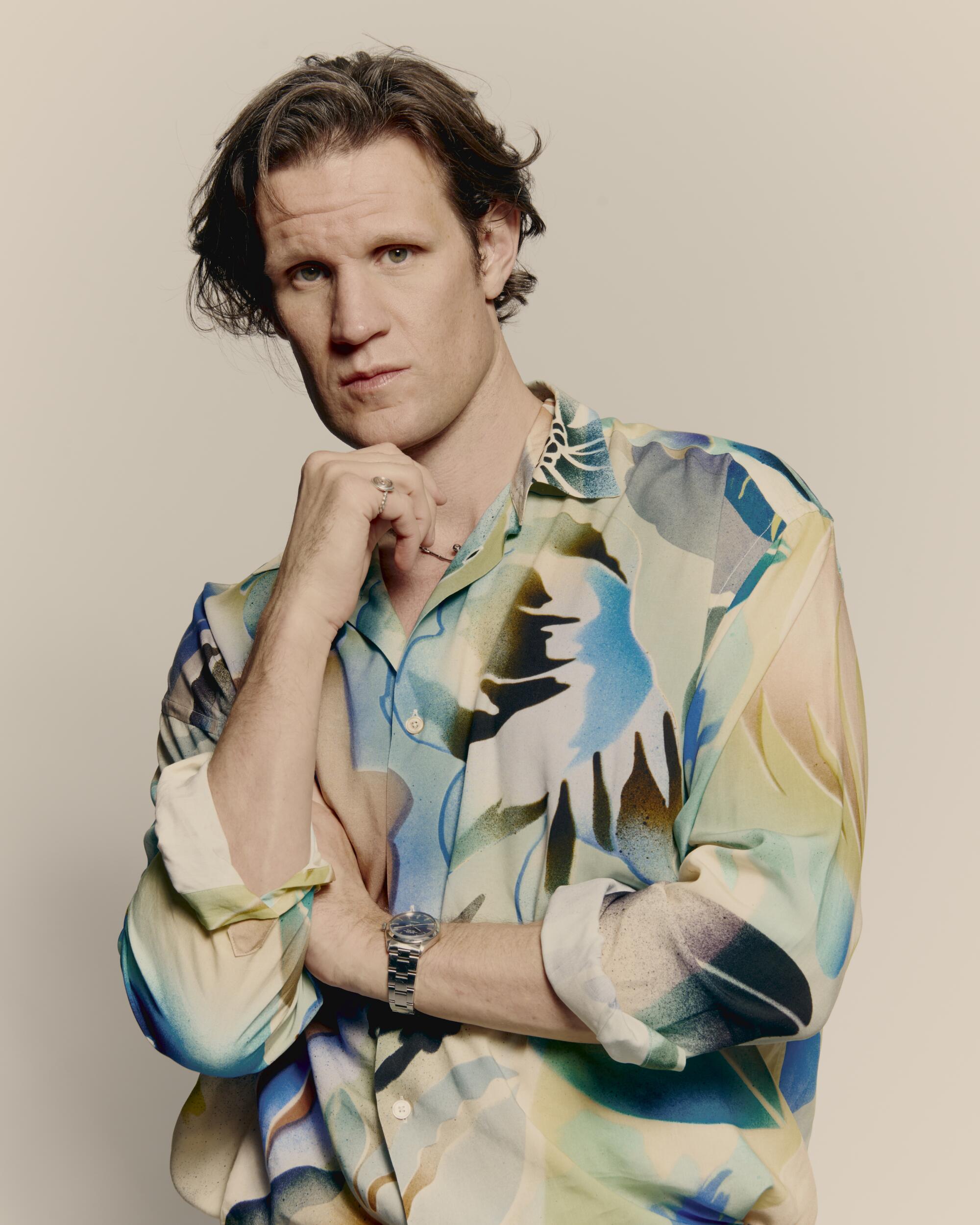
How do you approach the Rhaenyra and Daemon relationship and especially the love scenes between them? There is a certain —
Ick factor?
Yes.
It’s hard. You’re constantly questioning it. But you have to take the modern-day morality away. It’s a different time. It’s a story, and the story requires that these two characters do that. So you do it. But I think we were lucky with Clare Kilner, the director [of “King of the Narrow Sea,” the episode in which Daemon attempts to seduce young Rhaenyra]. She handled the sex scenes as well as I’ve seen them handled. Some people, I imagine, would watch it and they want more. And some people think, “This is too much.” But I don’t really get involved in all that. That’s up to the director to manage.
You’re like, “Just tell me where to stand?”
You learn it like that. It’s a bit like a ballet. We have a really good intimacy coordinator. And me and [Milly Alcock, who played young Rhaenyra] got on fabulously well and just laughed our way through that scene. It looks really serious, but me and Milly are just pissing our pants the whole time, laughing, going, “There’s all these naked people standing here. What are we doing?” You try and cut through the really weird tension of the room and make jokes.
Daemon and Rhaenyra sometimes speak to each other in High Valyrian, a language invented for the series. Is it freeing for you to speak in a language no one actually understands?
It is quite liberating. You know when you’ve got a friend and you go to France or somewhere, and they’re suddenly like [speaks in French-sounding gibberish] and this whole other part of them comes out, and you’re like, “Wow, you’re so attractive, what is this?” I found that with Daemon — what’s this other weird, attractive part of you?
Who is Craghas Drahar a.k.a. the Crabfeeder? What is the Triarchy? Where are the Stepstones? Your ‘House of the Dragon’ questions, answered.
What’s the process of learning it?
So there’s a recording of it. [Smith takes out his phone and plays a voice memo that sounds like: kesso cre no tenko toda luteum priyago rousse na joomla.] And then you just listen to that, and he breaks it down. OK, so kesso… cre… no… tenko. And then you practice, but you don’t want to get too hooked on doing it his way. I wanted it to sound conversational, like it was a proper language and felt lived in.
There are a lot of time jumps in this series. Was that disorienting for you as a performer?
I never know where we are. “Where are we in the past?” “Oh, I’ve got a new haircut? Good. That means I’m old.”
You had to wear a lot of wigs. Was that annoying?
I don’t mind the wig. It’s the bald cap that goes on under — that’s the bit that takes forever. These are champagne problems, but I find it quite hard to sit still. I keep going, “Can’t we just see his roots? He’s a human being, dammit!”
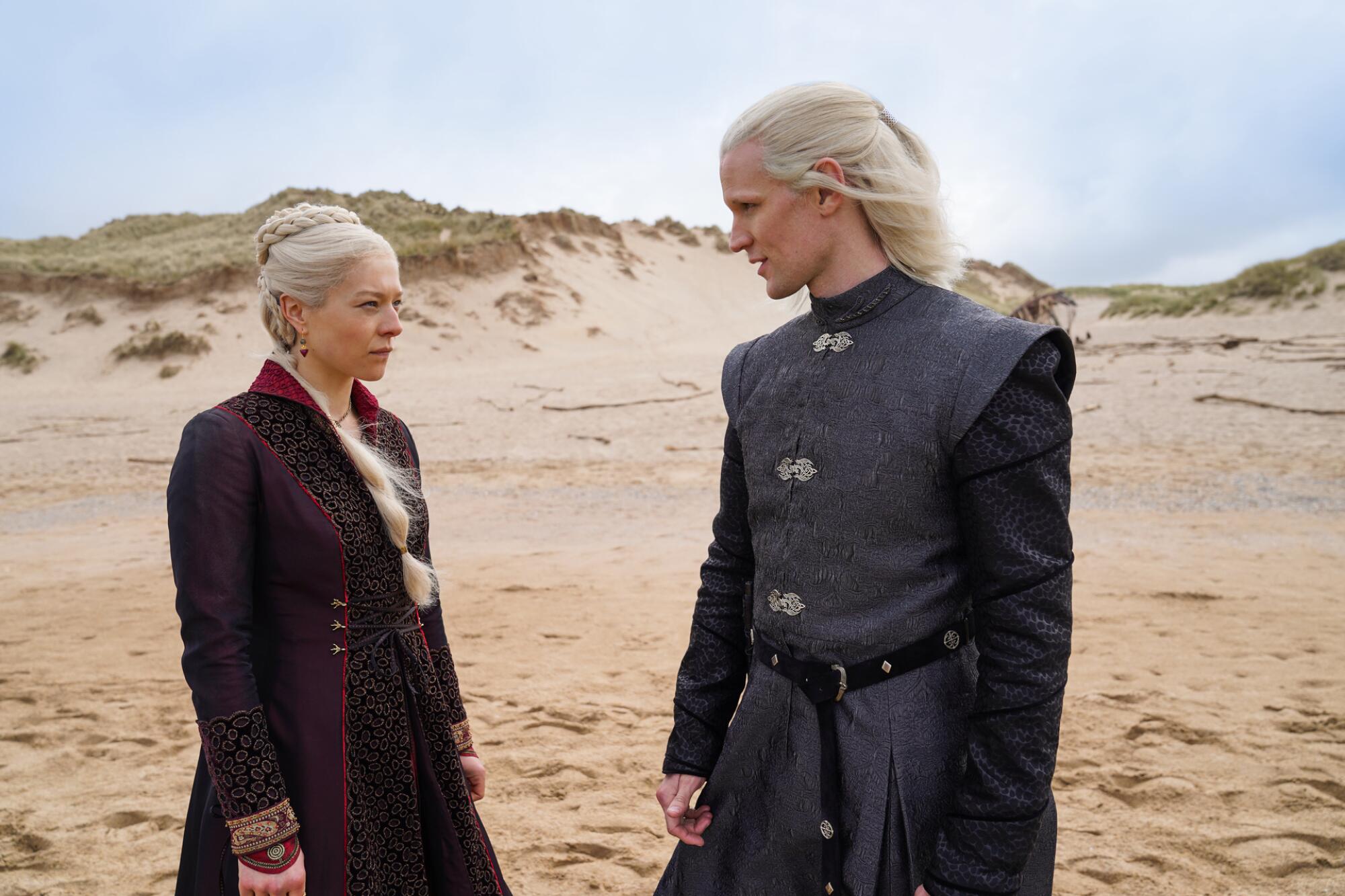
You were an elite soccer player as a teenager. Did your experience as an athlete translate to your work as an actor?
The parallels between sport and art are huge — the preparation, having to perform, the pressure of getting up when you get knocked down and having to respond and be in the moment. So I find it really useful.
I miss playing football. I struggled for a few years [after giving it up]. I was going to be a footballer. That was my whole identity. I feel very grateful that I’ve managed to find something like acting as a vocation.
You had a teacher who got you into acting. What do you think he saw in you?
He was just convinced that’s what I was good at, and he persuaded everyone around me too. I’m still friendly with him now. His name is Mr. Hardingham. He’s come to see every play I do. He’s just a really good bloke. I think in life you’re fortunate if you get one teacher that can help you transitioning to something that really engages you.
There was a lot of criticism of the last season of “Game of Thrones.” Did you feel any trepidation about this project because of that?
I thought [viewers] were quite hard on them. It’s very hard to tie up any story. I think the body of work that all the actors and filmmakers produced is undeniably fantastic. The ending didn’t bother me. And I thought [“House of the Dragon”] was its own beast. You can’t pay too much attention to that stuff.
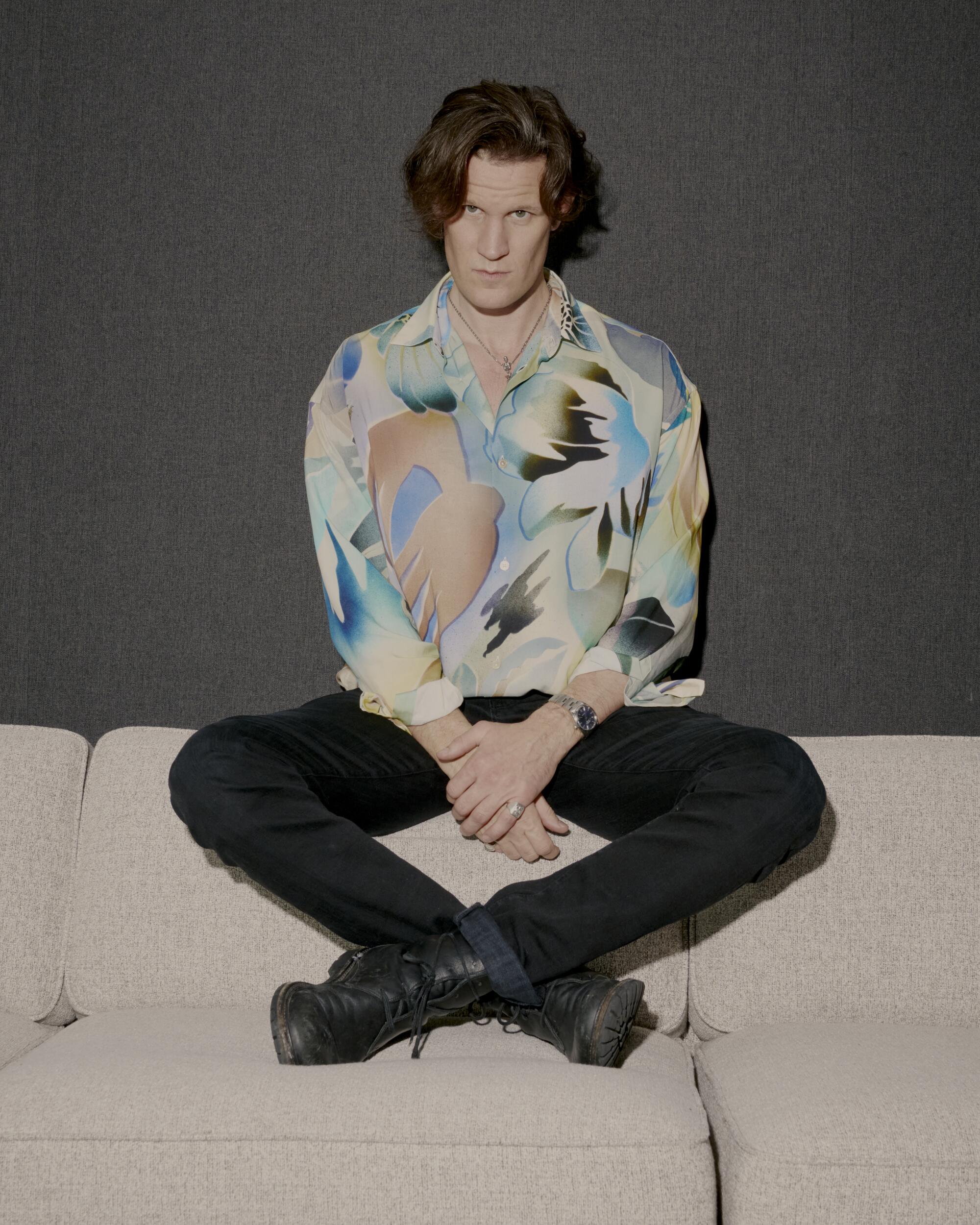
With Rhaenyra and Daemon, do you think there is real attraction there or just a shared thirst for power? Or can you not really separate those things when you’re a Targaryen?
I don’t think that you can, really. There is a deep but consistent pull towards one another for a whole host of reasons. It’s never just one thing. It’s hard because you’re asking me to comment on the relationship, but actually, I don’t really think of it in those terms. You just do it and let other people decipher it. It’s about giving over to the audience and letting them pick what it is. We’re just the vehicles. You can’t really have too much of an opinion on someone like Daemon because otherwise you’d never represent him with an even hand, because he does so much bad.
Right before he chops off Vaemond’s head, Daemon has a tender moment where he helps his ailing brother up the steps. That was Paddy Considine’s last episode. Tell me about filming that.
I was just there admiring Paddy. I think you can see there’s a lot of stuff added that wasn’t really in the script. Over the course of the season, because we’ve worked so closely together and developed a relationship with one another, we were able to be spontaneous in certain moments.
Daemon does not seem to age. What’s his secret?
He’s always eating his greens. Gets lots of sleep. And doesn’t give a flying f—.
I have to ask you, do you enjoy a Negroni sbagliato with prosecco in it?
I’ve tried a Negroni. But I don’t know that I’ve ever tried one with champagne in it. Why?
Emma D’Arcy said it was their favorite cocktail and the internet is losing its mind.
That sounds like Emma. I’ll have to try it.
‘House of the Dragon’
Where: HBO
When: Sunday, 9 p.m.
Streaming: HBO Max, anytime
Rating: TV-MA (may be unsuitable for children under the age of 17)
More to Read
The complete guide to home viewing
Get Screen Gab for everything about the TV shows and streaming movies everyone’s talking about.
You may occasionally receive promotional content from the Los Angeles Times.
